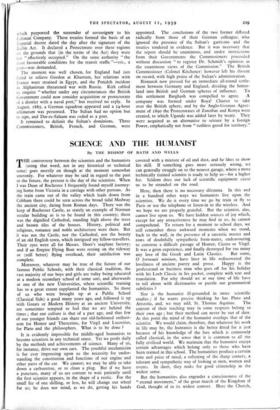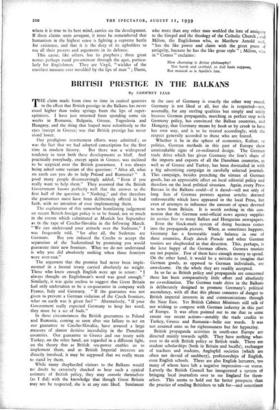SCIENCE AND THE HUMANIST
By THE BISHOP OF BATH AND WELLS
11 HE controversy between the scientists and the humanists 1 (using that word, not in any historical or technical sense) goes merrily on though at the moment somewhat unevenly. For whatever may be said in regard to the past or the future, the present is-the day of the scientists. When I was Dean of Rochester I frequently found myself journey- ing home from Victoria in a carriage with other persons. As the train came out of the valley which leads down from Cobham there could be seen across the broad tidal Medway the ancient city, dating from Roman days. There was the keep of Rochester Castle, as stately an example of Norman secular building as is to be found in this country; there was the dignified Cathedral, standing high above the trees and brown tiles of the houses. History, political and religious, romance and noble architecture were there. But it was not the Castle, nor the Cathedral, nor the beauty of an old English town, which intrigued my fellow-travellers. Their eyes were all for Messrs. Short's seaplane factory; and if an Empire Flying Boat were resting on the tideway or (still better) flying overhead, their satisfaction was complete.
Moreover, whatever may be true of the future of our famous Public Schools, with their classical tradition, the vast majority of our boys and girls are today being educated at a modern secondary school of some sort, and afterwards at one of the new Universities, where scientific training has to a great extent supplanted the humanities. So those of us who were brought up at a Public School (Classical Side) a good many years ago, and followed it up with Greats or Modern History at an ancient University, are sometimes tempted to feel that we are behind the times ; that our culture is that of a past age, and that few of our younger friends can share our old-fashioned enthusi- asm for Homer and Theocritus, for Virgil and Lucretius, for Plato and the philosophers. What is to be done ?
It is evidently impossible for middle-aged humanists to become scientists in any technical sense. Yet we profit daily by the methods and achievements of science. Many of us, for instance, drive our own cars. The youthful mechanician is for ever impressing upon us the necessity for under- standing the constitution and functions of our engine and other parts of the car. We cannot; we may be able to take down a carburettor, or to clean a plug. But if we have a puncture, many of us are content to wait patiently until the first scientist appears, in the shape of a rustic. For the small fee of one shilling, or less, he will change our wheel for us; he does not mind, as we do, getting his hands covered with a mixture of oil and dust, and he likes to show his skill. If something goes more seriously wrong, we can generally struggle on to the nearest garage, where a more technically trained scientist is ready to help us—for a higher fee. Seldom does our lack of scientific equipment cause us to be stranded on the road.
Here, then there is no necessary dilemma. In this and in a hundred other ways we humanists live upon the scientists. We do it every time we go by train or fly to Paris or use the telephone or listen-in to the wireless. And we hope we are properly grateful. But the scientist, alas, cannot live upon us. We have hidden sources of joy which, except for any attractiveness he may find in us, he cannot comprehend. To return for a moment to school days, we still remember those awkward moments when we stood, back to the wall, in the presence of a sarcastic master and rows of doubtfully sympathetic form-mates, endeavouring to construe a difficult passage of Homer, Cicero or Virgil. It was a grim experience, and finally destroyed for too many any love of the Greek and Latin Classics. But some, 0 fortunati nimium, have later in life rediscovered the loveliness of ancient poetry and prose. Happy is the professional or business man who goes off for his holiday with his Loeb Classic in his pocket, complete with text and translation. For why should we at our time of life have to toil about with dictionaries or puzzle out grammatical subtleties ?
Nor is the humanist ill-grounded in more scientific studies ; if he wants precise thinking he has Plato and Aristotle, and, we may add, St. Thomas Aquinas. The content of their teaching may in some respects belong to their own age ; but their method can never be out of date. At this point the mind of the humanist overlaps that of the scientist. We would claim, therefore, that whatever his work in life may be, the humanist is the better fitted for it just because of his knowledge of the lore which is commonly called classical, in the sense that it is common to all me fully civilised world. We maintain that the humanist enjoys certain advantages which belong only to those who have been trained in this school. The humanities produce a certain tone and poise of mind, a softening of the sharp corners, a tolerant and sympathetic way of looking at men, women and events. In short, they make for good citizenship in the widest sense.
But the humanities also engender a consciousness of the "eternal movement," of the great march of the Kingdom of God, thought of in its widest context. Here the Church, where it is true to its best mind, carries on the development. If these claims seem arrogant, it must be remembered that humanism in the highest sense is fighting a supreme battle for existence, and that it is the duty of its upholders to use all their powers and arguments in its defence.
This cause, like others, has its prophets ; three great names perhaps stand pre-eminent through the ages, particu- larly for Englishmen. They are Virgil, "wielder of the stateliest measure ever moulded by the lips of man" ; Dante, who more than any other man wedded the lore of antiquity to the Gospel and the theology of the Catholic Church ; and Milton, the Englishman who, as Matthew Arnold said, "has the like power and claim with the great poets of antiquity, because he has the like great style " ; Milton, who in " Comus " exclaims:
How charming is divine philosophy!
Not harsh and crabbed, as dull fools suppose, But musical as is Apollo's lute.









































 Previous page
Previous page